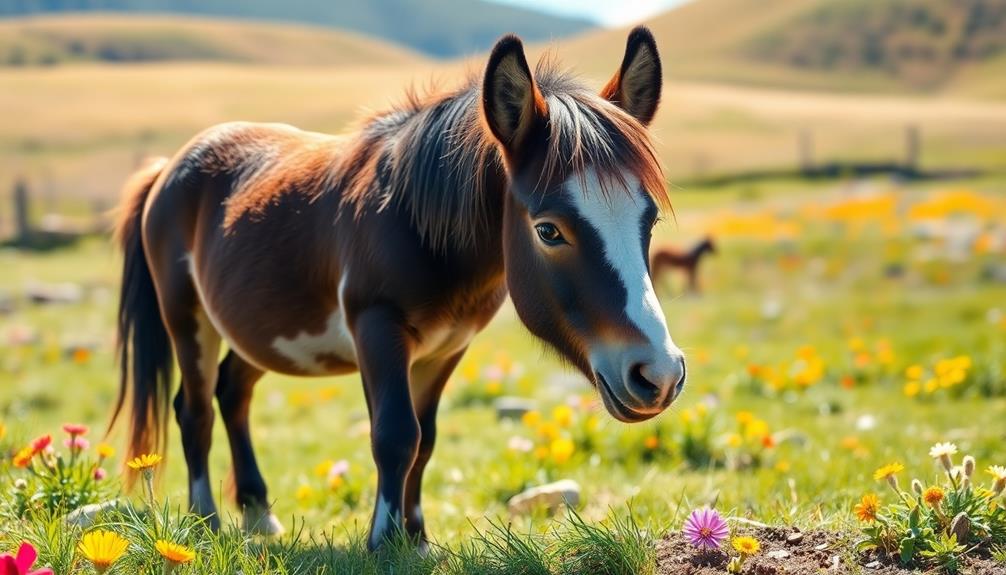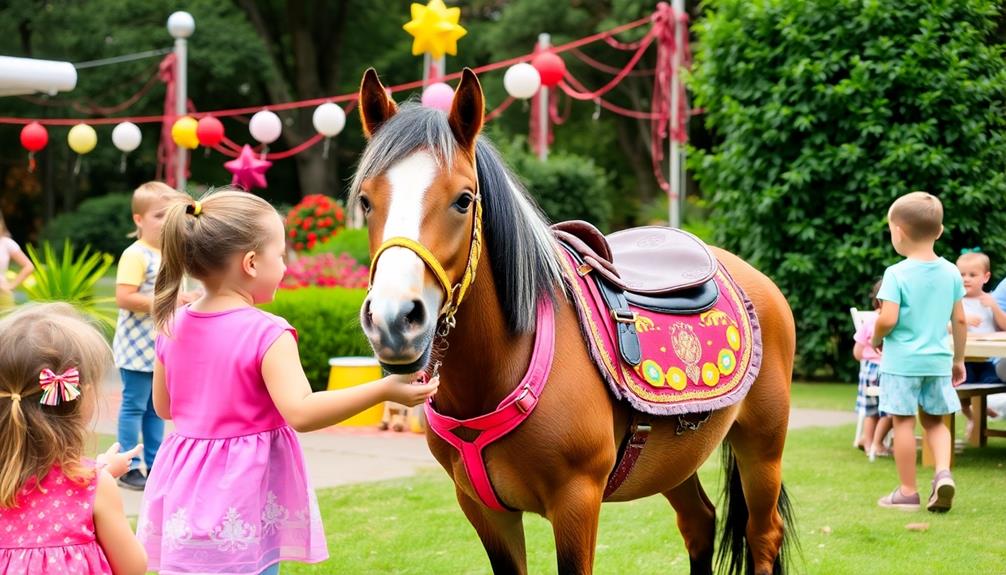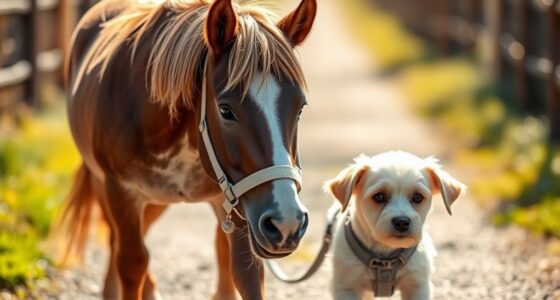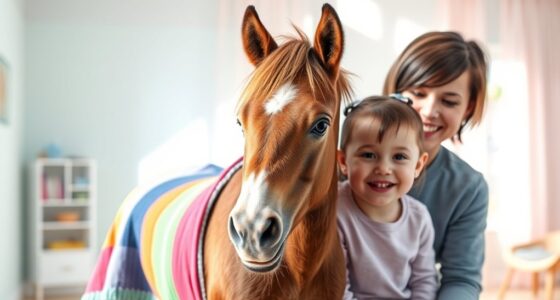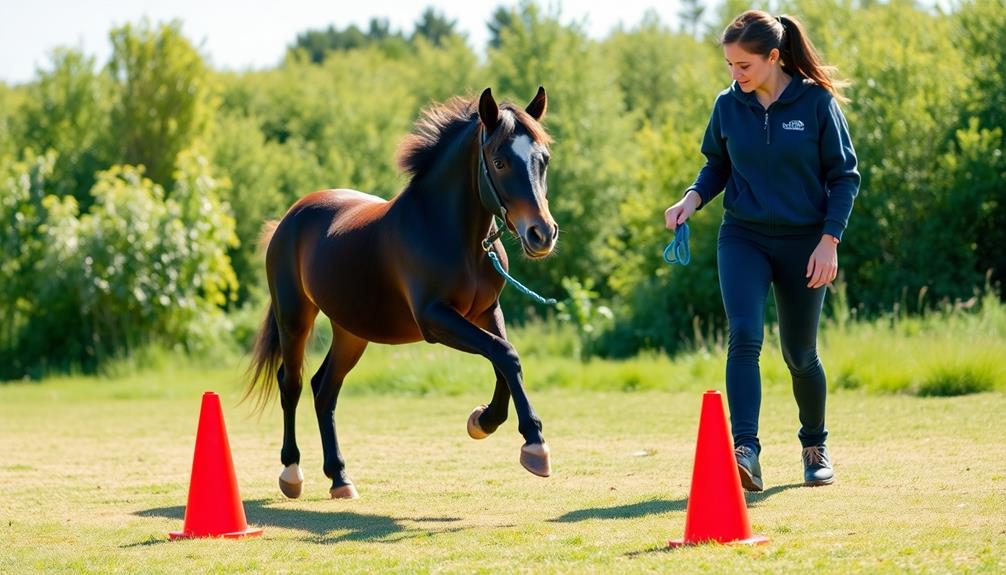Mini horses bite for several reasons, often rooted in their natural behavior and social needs. They explore their world through their mouths, and play or communication can lead to nipping. Lack of training can cause them to misunderstand boundaries, prompting unwanted biting. Isolation or boredom may trigger these behaviors, while discomfort can also be a factor. Hand feeding can unintentionally worsen this tendency by creating dependency on treats. By understanding these triggers and using positive reinforcement, you can promote better behavior. There's much more to explore about establishing a positive relationship with mini horses.
Key Takeaways
- Mini horses may bite as a natural behavior to explore their environment or during play with other horses.
- Lack of training and boundaries often leads to biting as a form of communication or attention-seeking behavior.
- Isolation or boredom can trigger biting due to stress or the need for stimulation and companionship.
- Hand feeding can create a dependency on treats, resulting in nipping when they associate hands with food rewards.
- Understanding triggers for biting, like discomfort or overstimulation, helps in managing and preventing aggressive behaviors.
Reasons for Biting in Mini Horses

Biting in mini horses can often stem from a few key reasons that are significant to understand. For young horses, exploring their environment with their mouths is a natural behavior. When they nip or bite, it's usually a form of communication or play. However, this behavior often indicates a lack of training and understanding of boundaries.
Young mini horses mimic the actions of their mothers and peers, which can lead to biting if they haven't been taught what's acceptable.
Additionally, biting can arise from discomfort, frustration, or a need for attention. If a biting horse feels ignored or anxious, it might resort to nipping to get a reaction from you.
It's vital to address these root causes rather than just the behavior itself. Social interactions with other animals and consistent training practices are important for teaching your mini horse acceptable behaviors.
The Impact of Hand Feeding

Hand feeding can greatly influence a mini horse's behavior and perception of humans. When you feed them directly, they often start to see you primarily as a source of food, which can heighten the risk of biting.
This practice can lead to a sense of entitlement, making mini horses more demanding and even aggressive if they feel their needs aren't met.
To avoid these issues, consider the following points:
- Dependency on Treats: Mini horses may become overly reliant on hand feeding for attention and affection.
- Nipping Behavior: They might nip or bite as they associate your hands with food rewards rather than appropriate social interactions.
- Behavioral Issues: Spoiling them through hand feeding can disrupt their understanding of boundaries.
- Safer Feeding Practices: Using buckets instead of hands can promote better feeding habits while keeping a safe distance.
Understanding Food Rewards

Food rewards can be a double-edged sword in training mini horses. While they can encourage positive behaviors, they can also lead to unintended consequences like biting. Since mini horses are prey animals, they don't naturally see food as a reward in the same way predators do. This difference means that when you use food rewards, your mini horse might start to view you as a food source rather than a partner.
If you hand-feed treats, you risk creating a dependency that can increase the likelihood of biting. Your mini horse may feel entitled to food, leading to demanding behaviors. Instead, consider offering treats in buckets. This method helps prevent the development of biting behaviors and promotes safer interactions.
Recognizing that food is a non-natural reward for horses can shift your approach to training. By focusing on alternative reinforcement methods, you can reduce the chances of aggressive behaviors.
You'll find that using praise, grooming, or playtime can be just as effective in fostering a positive relationship with your mini horse, without the risks associated with food rewards.
Identifying Aggressive Behavior

Understanding how to identify aggressive behavior in mini horses is important for any owner or trainer. Mini horses may show aggressive behaviors, like biting, due to fear, pain, or insufficient training and socialization. To effectively manage these behaviors, you need to recognize the signs early on.
Here are some key indicators of aggressive behavior to watch for:
- Ears pinned back: This is a clear signal that your horse is feeling threatened or defensive.
- Threatening posture: If your mini horse stands rigidly with its body tense, it may be preparing to bite or kick.
- Nipping or biting: While young foals might bite during play, it's essential to differentiate playful nipping from true aggression.
- Vocalizations: Snorting, squealing, or aggressive whinnying can indicate discomfort or aggression.
Identifying specific triggers for aggressive behaviors can help you develop effective training and behavior modification plans.
Pay attention to the interactions or situations that lead to biting, as understanding these triggers is important for creating a harmonious environment for both you and your mini horse.
The Role of Social Interaction
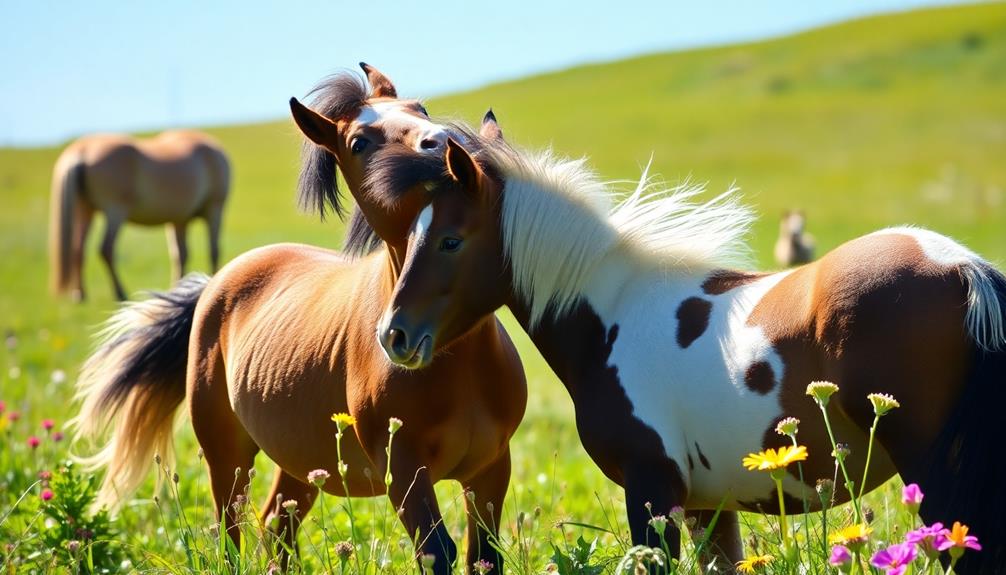
Social interaction plays an important role in the well-being of mini horses, as these creatures are inherently social animals. When they lack companionship, they can become frustrated and bored, leading to increased biting and aggressive behaviors.
It's vital to understand that young mini horses often engage in play behavior—roughhousing with peers to establish social bonds and hierarchies—which can sometimes be mistaken for aggression.
Mutual grooming is another significant aspect of their social interactions. This friendly behavior not only fosters connections among mini horses but also helps reduce stress and aggressive tendencies when they've suitable companions.
By introducing a companion, whether another horse or a similar animal, you can alleviate behavioral issues like biting, as social stimulation can counter feelings of isolation.
Understanding the social dynamics of miniature horses is important. They learn acceptable behaviors through interactions with others, so monitoring their social interactions and setting clear boundaries is vital.
Effective Training Techniques

When training your mini horse, it's essential to understand the triggers behind biting behavior.
You can use positive reinforcement strategies and consistent training practices to encourage good manners and discourage unwanted actions.
Understanding Biting Triggers
Biting in mini horses often arises from playful curiosity or a misunderstanding of boundaries, making it vital for you to recognize the specific triggers behind this behavior. By understanding these biting triggers, you can tailor your training strategies effectively.
Here are some common situations that may lead to biting:
- Playful Exploration: Mini horses may nip while engaging with their environment or other animals.
- Lack of Boundaries: Without clear limits, they mightn't realize when their behavior is inappropriate.
- Overstimulation: Excitement or anxiety can cause them to react impulsively, including biting.
- Attention-Seeking: They may bite to gain your attention, especially if they've learned it gets a reaction.
To address these triggers, consistent reinforcement of boundaries during training is essential. This helps them understand acceptable behavior while diminishing undesirable biting tendencies.
Regular socialization and structured handling sessions will also enhance their learning experience, allowing them to practice appropriate behaviors with both you and their peers.
Positive Reinforcement Strategies
Positive reinforcement is a powerful tool in training mini horses, helping you shape their behavior in a constructive way. When your mini horse is biting, it's crucial to redirect that behavior through rewards for positive actions. Focus on rewarding them for not biting by using treats or praise immediately after they display the desired behavior. This connection between their actions and the reward reinforces good behavior over time.
Consistency is key; make sure you apply positive reinforcement techniques throughout your training sessions. This helps your mini horse understand what's expected of them and improves their retention of good behaviors.
Incorporating a variety of training activities keeps their minds engaged, which can help prevent boredom-related biting. As you gradually increase the complexity of tasks, reward their progress consistently. This not only fosters confidence but also strengthens the bond between you and your mini horse.
Consistent Training Practices
Establishing consistent training practices is essential for effectively managing mini horse behavior. When you commit to regular sessions, you reinforce good manners and obedience, making it easier for your mini horse to understand what's expected.
Aim for training sessions lasting between 5 to 20 minutes, 2 to 3 times daily. This consistency helps solidify clear boundaries that prevent biting and encourage respect for personal space.
To enhance your training approach, consider these effective techniques:
- Use positive reinforcement to redirect negative behaviors by rewarding good actions.
- Incorporate regular handling and socialization with other animals to teach acceptable behaviors.
- Set clear boundaries during interactions to help your mini horse feel secure and understand limits.
- Remain consistent in your methods to guarantee long-term behavior modification.
Behavior Modification Strategies

To modify biting behavior in miniature horses, it's essential to identify what triggers this action.
By understanding these triggers, you can implement positive reinforcement techniques to encourage better behavior.
This approach not only helps reduce biting but also strengthens your bond with your mini horse.
Identifying Triggers for Biting
Identifying triggers for biting in mini horses is essential for effective behavior modification. When you understand the specific situations that prompt biting, you can address the underlying causes and create a more positive environment. Biting often stems from playful exploration, discomfort, or a need for attention.
Here are some common triggers to look out for:
- Isolation: Mini horses may bite when they feel lonely or stressed.
- Lack of stimulation: Boredom can lead to unwanted behaviors, including biting.
- Overexcitement: Young foals may bite during play, mistaking it for fun.
- Discomfort or pain: A horse might bite if it's feeling unwell or in pain.
You need to set up a structured routine that includes regular socialization with other horses. This helps them learn appropriate boundaries and reduces biting.
Additionally, monitor their environment for stressors and remove them whenever possible. By identifying triggers, you can redirect their focus and promote better interactions with you.
Consistent training routines that reward positive behaviors will foster a more harmonious bond between you and your mini horse.
Positive Reinforcement Techniques
Often, using positive reinforcement can greatly improve your mini horse's behavior, particularly when addressing issues like biting. This method involves rewarding desirable behaviors, which effectively redirects biting tendencies by reinforcing compliance and good manners. When your miniature horse responds appropriately, using treats or praise helps establish a positive association with good behavior, making them less likely to bite.
To achieve the best results, apply positive reinforcement consistently during training sessions lasting 5-20 minutes, 2-3 times daily. This routine reinforces boundaries and encourages respect for personal space.
Additionally, teaching alternative behaviors, like targeting or walking politely beside you, can replace biting actions with more acceptable responses. This not only improves behavior but also strengthens the bond between you and your horse.
Don't forget to monitor social interactions with other animals. Rewarding positive play can enhance social skills and reduce aggression, further minimizing the likelihood of biting behaviors.
The Monty Roberts Approach
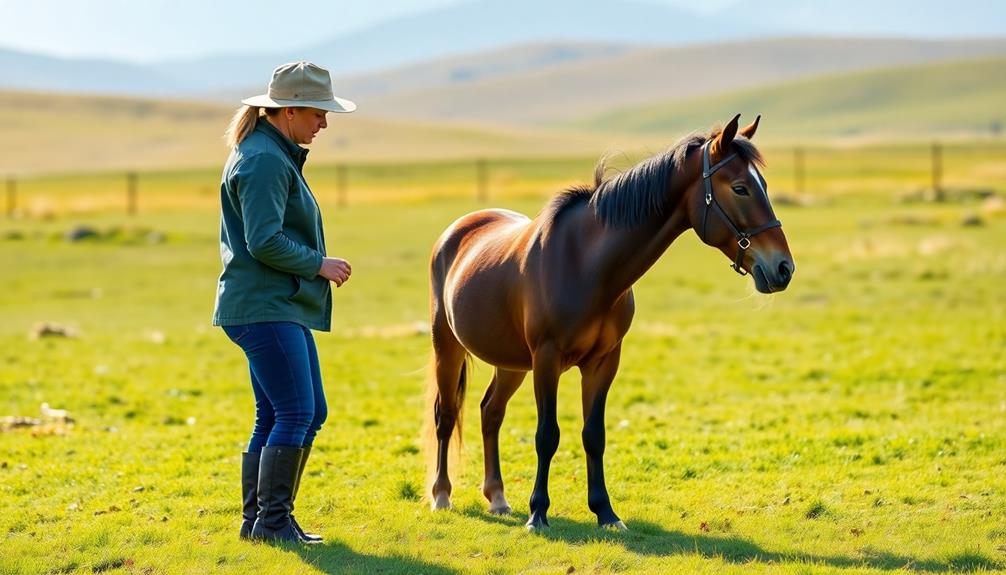
While many methods exist for addressing unwanted behaviors in mini horses, the Monty Roberts approach stands out for its gentle, non-punitive strategy. This technique focuses on creating a surprising association with the act of biting by lightly tapping a horse's shin. Instead of inflicting pain, this action encourages your mini horse to reconsider its behavior, linking biting with an unexpected response.
To effectively implement this method, keep the following in mind:
- Consistency is key: Quick responses to biting will lead to a gradual decrease in the behavior.
- Focus on distraction: The goal is to redirect your horse's attention away from biting.
- Promote a positive environment: Create a learning space where your horse feels safe and is less likely to exhibit a fear response.
- Use associative thinking: Help your horse understand the connection between its actions and your reactions.
Safety Measures for Handlers

When handling mini horses, using proper techniques is essential to prevent biting incidents.
Always approach them calmly and maintain a safe distance, especially if they seem unfamiliar or aggressive.
Proper Handling Techniques
Proper handling techniques are vital for guaranteeing the safety of both you and the miniature horse. When you interact with these animals, it's imperative to approach them calmly and confidently. This helps establish trust and minimizes the likelihood of biting.
Here are some key practices you need to follow:
- Always use protective gear, like gloves and steel-toed boots, when handling aggressive or unsure mini horses.
- Maintain a safe distance if a mini horse shows signs of agitation; this can prevent provoking aggressive behavior.
- Use a lead rope to guide the horse and establish clear boundaries for personal space.
- Supervise all interactions between mini horses and children or other pets to uphold safety.
Implementing these proper handling techniques not only protects you but also fosters a more positive relationship with the horse.
Preventing Biting Incidents
Preventing biting incidents with miniature horses requires a proactive approach to handling and interaction. Establishing clear boundaries during your interactions is essential. Consistently reinforce personal space and acceptable behaviors to help your mini horse understand what's expected. This foundation of trust can greatly reduce the likelihood of biting.
When handling horses known to bite, consider using protective gear like gloves and steel-toed boots. These measures can minimize injury risks while you're working with them. Additionally, implement slow feeding techniques by using buckets instead of your hands. This method reduces food-related anxiety and discourages biting behavior linked to treat dependency.
Always supervise interactions between miniature horses and children. Keeping a watchful eye guarantees safety and prevents aggressive behaviors from escalating.
Structured handling sessions lasting 5-20 minutes can also be beneficial. These sessions help build trust and respect over time, making it easier to manage your mini horse's behavior.
Building Positive Relationships

Building a strong bond with your miniature horse requires understanding their unique behaviors and needs. A key part of building positive relationships is recognizing that they may bite out of playfulness or curiosity.
To nurture this bond, consider the following strategies:
- Consistent Handling: Engage in structured training sessions lasting 5-20 minutes, 2-3 times daily to reinforce manners and trust.
- Positive Reinforcement: Use treats or praise to encourage desirable behaviors, creating a more affectionate connection.
- Socialization: Allow your mini horse to interact with other horses and animals, helping them learn acceptable behaviors through play.
- Establish Boundaries: Set clear guidelines during interactions to promote mutual respect, which enhances your overall relationship.
As you work on building positive relationships, remember to listen to your horse. Pay attention to their body language and reactions, which will help you respond appropriately and strengthen your bond.
Frequently Asked Questions
Why Does My Mini Horse Bite Me?
Your mini horse might bite you due to playful exploration or discomfort. If you've been hand feeding, they could see you as a food source. Establish boundaries and train consistently to manage this behavior effectively.
How Do You Discipline a Horse for Biting?
Disciplining a horse for biting's not rocket science! Focus on redirecting their behavior instead of punishment. Set clear boundaries, use positive reinforcement, and consistently engage in handling sessions to foster respect and good manners.
What Is the Attitude of a Miniature Horse?
Miniature horses are generally friendly and curious. You'll find they often seek your attention and enjoy engaging with you. Their playful nature can sometimes be mistaken for aggression, but it's usually just their way of interacting.
How to Stop a Shetland Pony From Biting?
Did you know that over 70% of biting issues stem from improper handling? To stop a Shetland pony from biting, establish boundaries, use positive reinforcement, and engage in regular, supervised sessions to reinforce good behavior.
Conclusion
In the world of mini horses, biting can feel like a thunderstorm on a sunny day, surprising and unsettling. By understanding their behavior and nurturing your bond, you can transform those stormy moments into gentle breezes of trust and respect. When you approach them with patience and knowledge, you're not just preventing bites—you're cultivating a beautiful partnership. Embrace the journey, and watch as your connection with these little equine companions blossoms like a wildflower in spring.
